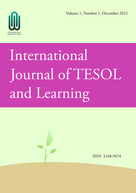


Volume 11 Issues 1-4 (2022-12-31)
Volume 10 Issues 3&4 (2021-12-31)
Volume 10 Issues 1&2 (2021-06-30)
Volume 9 Issues 3&4 (2020-12-31)
Volume 9 Issues 1&2 (2020-06-30)
Volume 7 Issues 3&4 (2018-12-31)
Volume 6 Issues 3&4 (2017-12-31)
Volume 6 Issues 1&2 (2017-06-30)
Volume 5 Issues 1&2 (2016-06-30)
States are establishing high stakes assessments to serve as measurement tools of students’ academic abilities. This study essentially compares Maryland’s and Florida’s mathematics and science assessments for similarities and differences. Building from 5-10 years of student level quantitative data (secondary data) and critical analyses of the states’ exams, the examination of the effects of increase testing on student subgroups, and the impacts of increase testing on Maryland’s and Florida’s graduation rates were looked at. Data reveals the negative impacts of increase testing on students’ performance, particularly those of low socioeconomics and those that are of a minority status—Black or Hispanic. Moreover, secondary data analyzed revealed that: (a) there were some similarities and differences between Maryland’s and Florida’s assessments, and (b) for both states, poor minority students were the lower performers. For future studies, it is recommended that more analyses of states’ assessments and students’ performance be conducted in order to enhance the educational literature, particularly with respect to assessment issues.
This action research aimed to investigate higher education foreign language (FL) instructors' perceptions and practices of autonomy in an institute with a transformative pedagogical framework, as research studies suggest that teacher autonomy is closely related to teacher empowerment, motivation, and learner autonomy. This study is centered on the underlying notion that autonomy is key to achievement and performance in teaching and learning; learner autonomy is inextricably interwoven with teacher autonomy. Although this is well documented in the literature, such insight may not be directly utilized to inform pre-service and in-service teacher training. Also, institute culture alone is solely one factor affecting autonomy, as cultural dimensions of the target language countries from which teachers are from may be a factor in exercising autonomy. With this in mind, the following research question was explored; What are FL instructors' perceptions regarding their implementation of teacher autonomy? The authors administered a questionnaire comprised of three dimensions: General teaching autonomy, curriculum autonomy, and professional development autonomy. Based on the results, recommendations are provided on how pre-service and in-service training can develop teachers' capacities to self-direct their learning, including the ability to identify when, where, how, and from what sources they learn based on the study's F2F setting. Additionally, because of the recent mass transition to virtual teaching due to the pandemic, implications of how the F2F findings informed online pre-service and in-service training to foster autonomy within a culture of a transformative pedagogical framework are also offered.